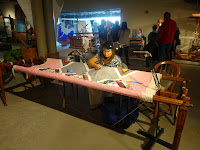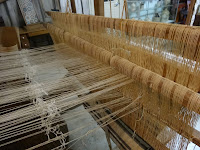 The Rural Life Museum is a fabulous place to see old stuff like quilts and carriages, horseshoers and soapmakers, slave cabins and schoolhouses. A couple of times a year, they have costumed docents doing things like it was done in 1700 and 1800's. They answer questions and demonstrate techniques and products. We love to go and walk the gardens and tour the exhibits and talk to the people.
The Rural Life Museum is a fabulous place to see old stuff like quilts and carriages, horseshoers and soapmakers, slave cabins and schoolhouses. A couple of times a year, they have costumed docents doing things like it was done in 1700 and 1800's. They answer questions and demonstrate techniques and products. We love to go and walk the gardens and tour the exhibits and talk to the people. Before we left I showed Carrie the new reindeer glasses I found at the drug store yesterday. I love them! Flashers!
Before we left I showed Carrie the new reindeer glasses I found at the drug store yesterday. I love them! Flashers! I had an idea we would see Renee there and she was! Quilting away like they did
in the olden days!
The kids were in school and the carolers were hurrying around getting themselves organized. And there was a bagpipe group that played Christmas Carols.
I had no idea bagpipes were that versatile!


The grounds were so beautiful.


We walked around the grounds until we were so hungry we wanted hamburgers from the Times Grill.

The Burden Center is a research facility for all kinds of plants and vegetables.
Aren't you glad you don't have to wash our family's clothes in this contraption?
But then this dove cote is amazing! I want one!
We rode through the buildings and exhibits on the mule drawn wagon
Oh, and this exam table is frightening!
 This is a Spinning Jenny. Wikipedia says
This is a Spinning Jenny. Wikipedia saysJames Hargreaves invented the spinning jenny. He was from Blackburn England which was known for the production of "Blackburn greys," cloths of linen warp and cotton weft. They were usually sent to London to be printed.
At the time, cotton production could not keep up with demand, and Hargreaves wanted to improve the process. The flying shuttle, invented by John Kay in 1733, had increased yarn demand by the weavers by doubling their productivity and now the spinning jenny could supply that demand by increasing the spinners' productivity even more. The machine produced coarse thread.

The idea was developed by Hargreaves as a metal frame with eight wooden spindles at one end. A set of eight rovings was attached to a beam on that frame. The rovings when extended passed through two horizontal bars of wood that could be clasped together. These bars could be drawn along the top of the frame by the spinner's left hand thus extending the thread. The spinner used his right hand to rapidly turn a wheel which caused all the spindles to revolve, and the thread to be spun. When the bars were returned, the thread wound onto the spindle. A pressing wire (faller) was used to guide the threads onto the right place on the spindle.


 Here are some other exiting things I found.
Here are some other exiting things I found. Some old quilts and a weaving loom.

There were about 15 old sewing machines.
After the day was over, we were happy we live in today's time. And wonder if the things we use today will be in museums of the future!












Very neat museum. Thanks for sharing pictures. I can barely keep up with the laundry so I couldn't imagine using one of those contraptions. And to the museum of the future, I would like to donate my pink princess phone. LOL
ReplyDeleteOk who is the a criminal Minds fanatic? I have never watched the show but am now caught in the word of crime show reruns.....
ReplyDelete